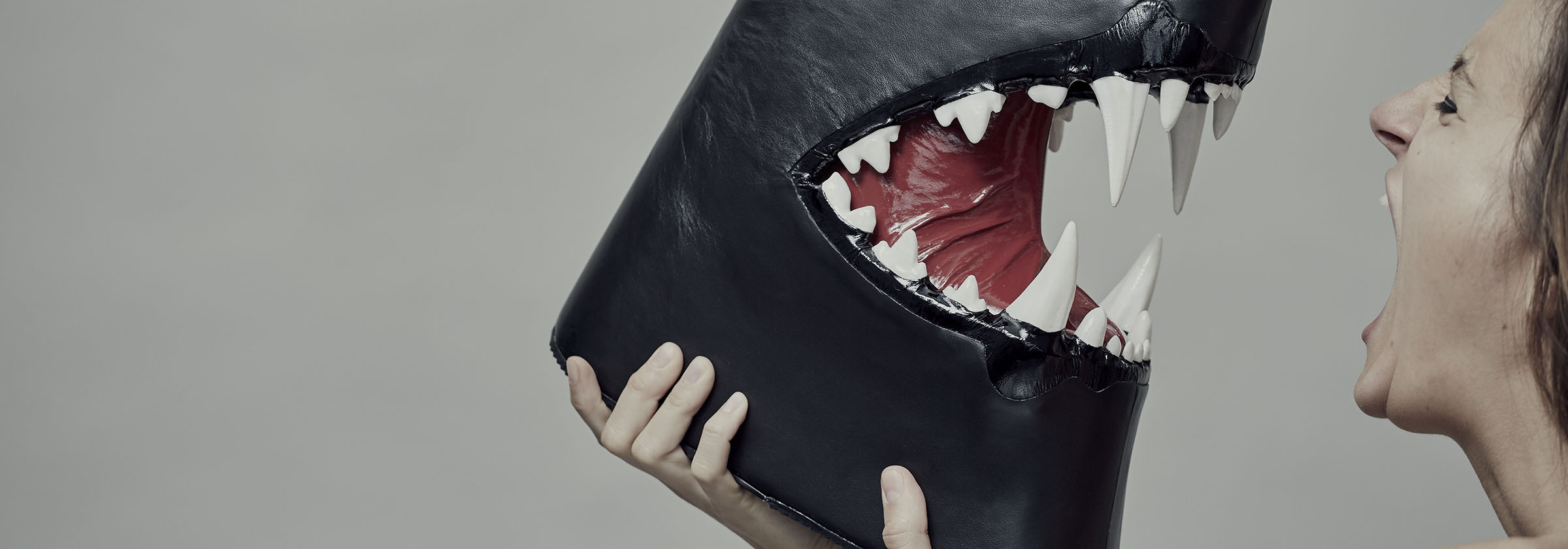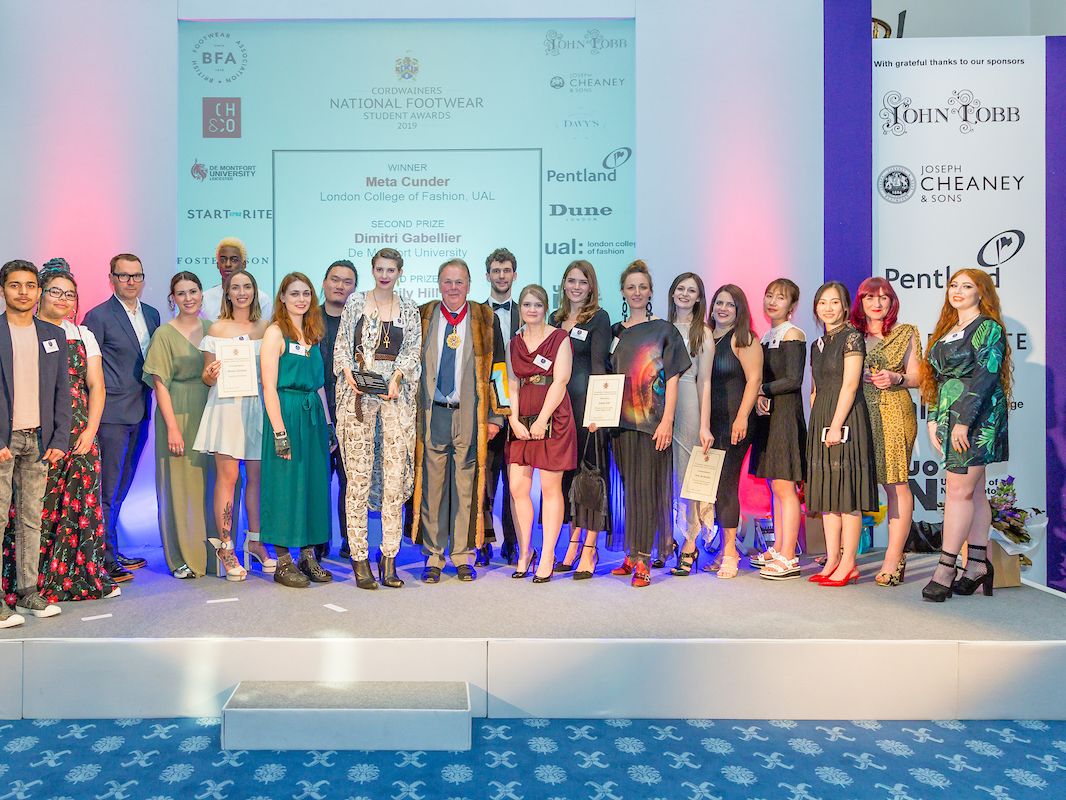The Worshipful Company of Cordwainers celebrated in June the National Footwear Student of the Year competition. Launched as an event dedicated to celebrate and encourage young footwear talent, students from London College of Fashion presented their designs in front of industry guests and the expert panel, competing against students from University of Northampton and De Montfort University.
This year, the Monster boot created by LCF's BA (Hons) Cordwainers Footwear graduate Meta Cunder won the 1st prize thanks to the originality of her design and its impactful look. We spoke with her to find out more about her experience at the awards ceremony and the inspiration behind her "creature shoes."

Hi Meta. First of all, congratulations for winning the Cordwainers' National Footwear Student of the Year Award! How did you feel when you found out that you had won?
Thank you! Well… you never expect these things, there is such a high level of competition and an amazing display of talent. Hearing my name called on the stage was absolutely surreal – the photographer even had to tell me to calm down a few times while making sure I smiled for the camera.
What does this achievement mean to you and your career as a footwear designer?
Simply put: it’s the best thing that could happen to a footwear graduate in the UK.
And it's not only about the honour of the award itself and the recognition, but also the incredible network of people I met at the event from various areas of the industry. Knowing that I can reach out and ask for help or advice when I am starting out is truly invaluable.
Tell us about your winning design. Did you have a clear idea of the type of shoe you wanted to create from the beginning?
I wouldn’t say I had a clear idea of what I wanted the shoe to look like, but I knew what I wanted it to feel like: alive! I’ve always felt that the shoes I bought for myself had personalities, I even named them sometimes. I wanted to bring this idea of a personality into my design, but on a more extreme level and design the shoes as living beings and creatures.

Where did you take the inspiration for this collection?
I’ve been toying with the idea of ‘creature shoes’ since I was a teenager — ahead of the project I pulled out old sketches and ideas to kickstart the process. However, the finer details and overall mood for the collection came from my research into various mythologies and different animalistic features — did you know that a lot of water birds have spiky tongues and mouths? I didn’t!
A big driving force in the creation of my brand Varmint has been the people I was aiming to create for — one of them being my muse and eventual model Rodent, who is a London based non-binary drag performer. In an interview, they described themselves as ‘an androgynous feral witch’, and that helped set the mood for the debut collection.
Let’s talk a bit about your time at LCF. Did you always know you wanted to become a footwear designer?
I always knew I wanted to do something creative. I’ve been drawing since a very young age and organically discovered fashion as a form of artistic self-expression during high school. Shoes were something that fascinated me because of their sculptural form and the way they completely transformed a person thought the way they walk and carry themselves.
I also have a personal love for high shoes, be it platforms or heels. I’m quite tall and I grew up being very self-conscious about being different. I have managed to embrace my height and started to emphasise it with big chunky platforms and heels - standing out made me feel more confident and more like myself.
Why did you decide to study at LCF?
To be honest, I found this course by accident! I was already in love with shoes but never thought that shoe design was something I could actually study. I googled ‘shoe design university’ as a joke and was surprised to find a course in London. Seeing all the positive reviews was great, but what really did it for me was the interview at the Golden Lane Campus – seeing shoes made on-site and all the specialist machinery was fascinating. I knew then that this was where I wanted to study!
What have you enjoyed the most about studying the BA Cordwainers Footwear course?
It is hard to point at one specific thing, but I would definitely say that making was always my favourite part of each project. I feel that this is also the skill I am most proud of — a lot of people that see my shoes on social media or real life don't realise I made them from start to finish. When I tell them, they are usually quite shocked!
Credits - Photographer: Ben Mak; Model: Rodent
Now that you've graduated, what are your plans for the next few years?
In September, I am starting as a design internship at Nicholas Kirkwood, a position I earned after winning the industry project back in my 2nd year at LCF. I was not able to do it during my DIPS year, but the company was kind enough to move it until after I graduated!
I'm also working with my long-term collaborator, fellow LCF alumni and womenswear designer Ben Mak. We focus on two niche areas of the market: on one hand, we create showstopping performance pieces that cater to the entertainment industry, especially the drag scene. And, on the other hand, we make clothes and shoes for an age-diverse audience in an attempt to get rid of age discrimination in fashion. We believe that everyone deserves to look and feel fabulous.
What advice would you give to future students who would like to start a career in cordwainers?
I can think of three things: 1. Work hard. This course allows you to really explore areas of your interest in depth, but the level of knowledge and professionalism will largely depend on your own enthusiasm and hard work. In short, the more you give, the more you get. 2. If you can, do a DiPS year. On top of looking great on your CV, it allows you to experience an area of the industry first hand. Either you find something you love, or you learn what you would like to avoid in the future. 3. Be nice. It is a small industry, so everyone knows everyone — you never know where your next project or job will come from.
- Follow Meta on Instagram
- Find out more about BA (Hons) Cordwainers Footwear: Product Design and Innovation
- Explore LCF undergraduate courses
- What’s on at LCF: open days and events
- More LCF Stories



